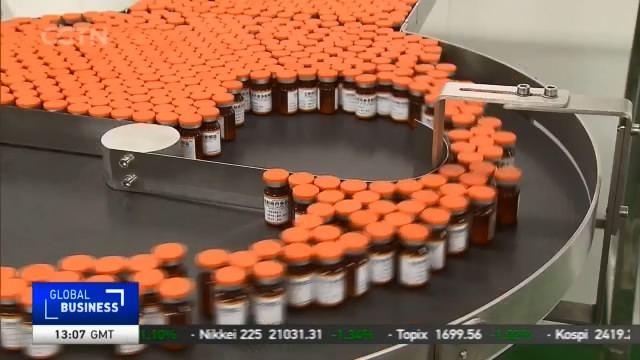
21:30, 28-Mar-2018
Drug Tariff Cuts: China to lower import tariffs on anti-cancer drugs

China plans to open its pharmaceutical sector more to foreign imports despite ongoing trade conflicts. The move comes after Premier Li Keqiang promised at the just-concluded Two Sessions to cut tariffs on anti-cancer drugs. What will the action mean for pharmaceutical companies? Mi Jiayi has more.
Premier Li Keqiang told the Two Sessions that tariffs on anti-cancer drugs will be cut to zero and that foreign access to the service sector including medical services will be improved. Data from the National Cancer Center show that China has 4.3 million new cancer patients every year, and that 2.8 million die. One Shanghai government official says the tariff cut should be good news for these patients.
WU WENHUI, DIRECTOR OF DRUG ADMINISTRATION SHANGHAI MUNICIPAL COMMISSION OF HEALTH AND FAMILY PLANNING "The demand for imported anti-tumor drugs is very high because China has a high incidence of cancer. Domestically made drugs are very few. There are many generics, but they are not as good as the original ones. Usually it costs several thousands to tens of thousands of yuan to buy the real drugs, and patients could have to pay hundreds of thousands of yuan for one course of treatment."
Wu says the average tariff on cancer drugs is around five to eight percent. Moreover, most of them are not covered by the national medical insurance plan, which means patients have to pay for these drugs themselves. Apart from patients, of course, the anti-cancer drug manufacturers also welcome the news. Boehringer Ingelheim is one of them, as the company's anti-lung cancer medicine received approval for sale in the Chinese market in February last year. BI has been working with regulators and provincial government administrators to lower the prices for their drugs, and new tariff cuts will be a further step in the process.
DAVE PRESTON, CHAIRMAN & CEO BOEHRINGER INGELHEIM GREATER CHINA MARKET "From a pharmaceutical manufacturer's point of view it is very clear that we are very delighted. This will aid us again to lower the prices of the drugs. Different drugs have different tariffs, but what I can say is that whatever the cut is, we will pass on the full cuts to the patients. So whether that will be 5 percent, 10 percent, 20 percent, I can assure you that BI will pass on that cut fully to the patients."
There still remains a large market for generic medicines in China, however, because some of the original drugs remain too expensive for many patients. Still, Wu says the tariff cuts could have an impact on the generic medicine market.
WU WENHUI, DIRECTOR OF DRUG ADMINISTRATION SHANGHAI MUNICIPAL COMMISSION OF HEALTH AND FAMILY PLANNING "There will be impacts on domestic pharmaceutical companies, but this depends on the price gap between the original medicine and generic one. If it's a large gap, the tariff cuts won't mean much to patients. But overall, domestic manufacturers will feel the pressure."
Wu says that apart from tariff cuts, there are other difficulties for patients needing imported medicines. One is that imported drugs need to take their own set of clinical tests before they are allowed to sell in the Chinese market, and it can take years for them to pass those test. Many are hoping the government will hasten that process as well, to help benefit more patients.

SITEMAP
Copyright © 2018 CGTN. Beijing ICP prepared NO.16065310-3
Copyright © 2018 CGTN. Beijing ICP prepared NO.16065310-3